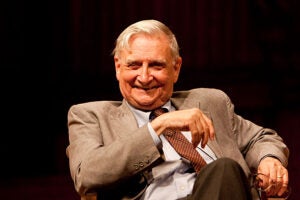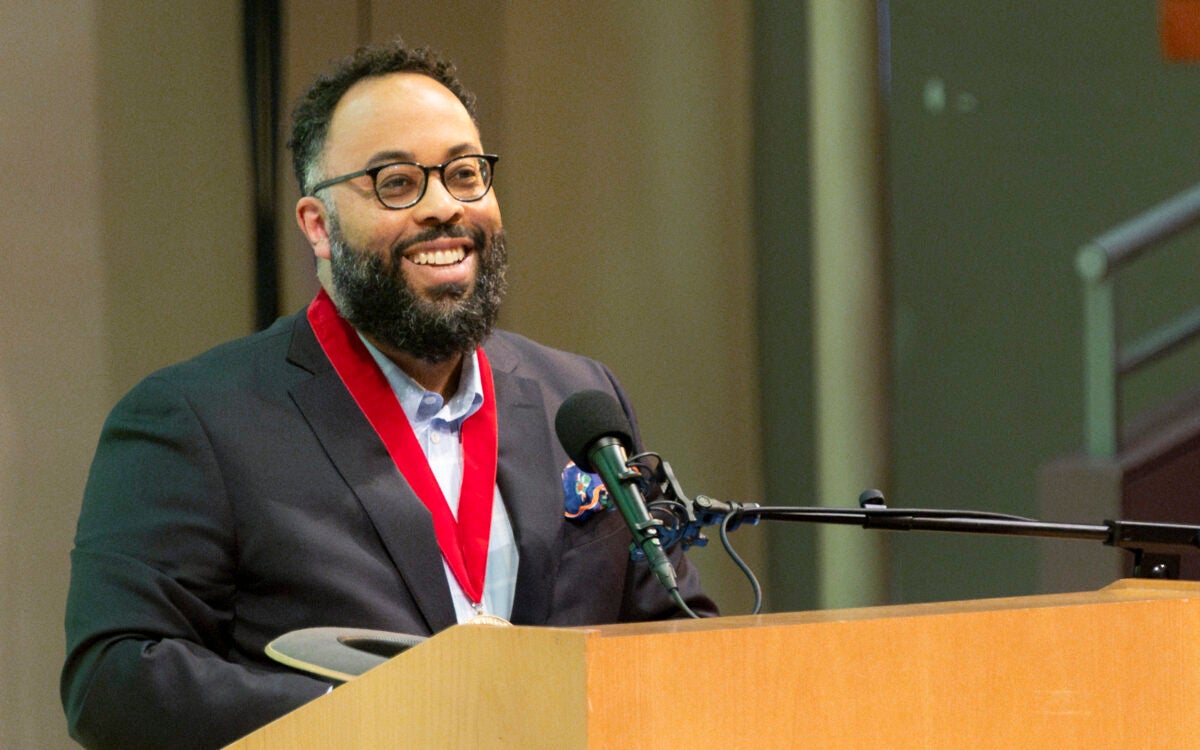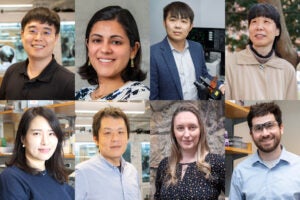Tag: Life Sciences
-
Nation & World
Wildlife biologist named Roger Tory Peterson Medal recipient, speaker
Russell Mittermeier, renowned wildlife biologist and president of Conservation International, has been selected to receive the 12th annual Roger Tory Peterson Medal presented by the Harvard Museum of Natural History (HMNH). Mittermeier will deliver the Roger Tory Peterson Memorial Lecture on April 5.
-
Nation & World
Concentration in human development, regenerative biology added
Inviting a new generation of scientists into the study of human development, disease, and aging, Harvard University will offer a new undergraduate concentration in Human Developmental and Regenerative Biology (HDRB) starting this fall.
-
Nation & World
Scientists create cell protein machinery
Harvard scientists have cleared a key hurdle in the creation of synthetic life, assembling a cell’s critical protein-making machinery in an advance that has practical, industrial applications and that enhances our basic understanding of life’s workings.
-
Nation & World
Blood types indicate greater risk for cancer
Offering a novel clue about the basic biology of pancreatic cancer, researchers at Dana-Farber Cancer Institute have confirmed a decades-old discovery of a link between blood type and the risk of developing the disease.
-
Nation & World
Watching evolution in real time
In 1831, the young Charles Darwin set off on the H.M.S. Beagle, a Royal Navy sloop bound for detailed surveys of South America. He took with him the first volume of the massive trilogy “Principles of Geology” by Scottish geologist Charles Lyell. (He had the other volumes sent later.)
-
Nation & World
Capillary formation’s mechanical determinants
Harvard researchers have established a link between the growth of blood vessels and the mechanical stresses caused by the environment within which the vessels grow, a new understanding that researchers hope can lead to novel disease treatments based on manipulating blood flow to living tissues.
-
Nation & World
Walsh named to AAM board
Christopher T. Walsh, the Hamilton Kuhn Professor of Biological Chemistry and Molecular Pharmacology at Harvard Medical School (HMS), has recently been elected by the American Academy of Microbiology (AAM) to its Board of Governors — alongside five other newly elected microbiology scientists joining the board.
-
Nation & World
Darwin’s empathy, imagination highlighted
On Feb. 12, the world celebrated the 200th anniversary of Charles Darwin’s birth. Much was made of his key idea, natural selection, and how it still resonates and informs science in the 21st century.
-
Nation & World
Bacteria have more to say than previously thought
Bacteria are the oldest living organisms, dating back 4 billion years. So it is only logical that they have evolved ways to communicate.
-
Nation & World
Science programs advancing
Harvard President Drew Faust today renewed the University’s commitment to the vision of advancing interdisciplinary, collaborative science in general, and the Department of Stem Cell and Regenerative Biology (SCRB), the Harvard Stem Cell Institute (HSCI), and the Wyss Institute for Biologically Inspired Engineering (WIBIE) in particular.
-
Nation & World
Exploring abundance under the sea floor
Called the North Pond Basin, the site — researchers at Harvard and beyond believe — can provide a window onto a vast world of subterranean microscopic life that extends kilometers below the Earth’s surface and which, according to rough estimates, could rival life above the surface in both diversity and sheer mass.
-
Nation & World
Neural wiring hints at nervous system gene limits
Genetics may play a surprisingly small role in determining the precise wiring of the mammalian nervous system, according to painstaking mapping of every neuron projecting to a small muscle mice use to move their ears. These first-ever mammalian “connectomes,” or complete neural circuit diagrams, reveal that neural wiring can vary widely even in paired tissues…
-
Nation & World
Wilson receives NCSE’s Lifetime Achievement Award
Harvard professor Edward O. Wilson is the recipient of a Lifetime Achievement Award from the National Council for Science and the Environment (NCSE).

-
Nation & World
Neural mapping paints a haphazard picture of odor receptors
Despite the striking aromatic differences between coffee, peppermint, and pine, a new mapping of the nose’s neural circuitry suggests a haphazard patchwork where the receptors for such disparate scents are as likely as not to be neighbors.
-
Nation & World
Faculty of Arts and Sciences Standing Committees 2008-09
Upon the recommendation of the dean of the Faculty of Arts and Sciences (FAS), Harvard President Drew Faust has approved and announced the following Standing Committees. Standing Committees of the faculty are constituted to perform a continuing function. Each committee has been established by a vote of the faculty, and can be dissolved only by…
-
Nation & World
New obesity-related genes identified
A large international consortium has made significant inroads into uncovering the genetic basis of obesity, adding six new genetic variants to the two already linked to higher body mass index (BMI) in previous studies. Most of the newly discovered genes had never before been suspected of having a role in body weight and, curiously, many…
-
Nation & World
Newsmakers
Alfred Goldberg, cell biology professor at Harvard Medical School (HMS), recently received a $15,000 cash prize as the recipient of the 11th annual Jacob Heskel Gabbay Award for Biotechnology and Medicine from Brandeis University.
-
Nation & World
Research may lead to treatment for retinitis pigmentosa
Rods and cones coexist peacefully in healthy retinas. Both types of cells occupy the same layer of tissue and send signals when they detect light, which is the first step in vision.
-
Nation & World
Of Neanderthals and dairy farmers
Harvard Archaeology Professor Noreen Tuross sought to rehabilitate the image of Neanderthals as meat-eating brutes last week, presenting evidence that, though they almost certainly ate red meat, Neanderthal diets also consisted of other foods — like escargot.
-
Nation & World
Education Portal is a gateway to learning
Education, excitement about learning, and a sense of curiosity were the themes of the day as Harvard undergraduates and the Allston children they mentor joined Boston Mayor Thomas M. Menino, Harvard President Drew Faust, and dozens of Allston families to celebrate the Harvard Allston Education Portal on Nov. 21.
-
Nation & World
Scientists explore nature’s designs
As a graduate student, Harvard physical chemist Joanna Aizenberg acquired a passionate curiosity about — of all things — sponges. She particularly liked the ones made of glass, whose apparent fragility belied the fact that they could withstand terrific pressure in the deep sea.
-
Nation & World
Quantum computers could excel in modeling chemical reactions
Quantum computers would likely outperform conventional computers in simulating chemical reactions involving more than four atoms, according to scientists at Harvard University, the Massachusetts Institute of Technology (MIT), and Haverford College. Such improved ability to model and predict complex chemical reactions could revolutionize drug design and materials science, among other fields.
-
Nation & World
For innovative undergrads, bacteria make some buzz
A team of undergraduates who engineered a bacterial biosensor with electrical output recently made some buzz at the 2008 international Genetically Engineered Machine (iGEM) competition held at the Massachusetts Institute of Technology (MIT).
-
Nation & World
A single gene leads yeast cells to cooperate against threats
An ingenious social behavior that mobilizes yeast cells to cooperate in protecting each other from stress, antibiotics, and other dangers is driven by the activity of a single gene, scientists report this week in the journal Cell. The cooperating cells use the same gene, dubbed FLO1, as a marker for detecting “cheaters,” cells that try…
-
Nation & World
Global warming predicted to hasten carbon release from peat bogs
Billions of tons of carbon sequestered in the world’s peat bogs could be released into the atmosphere in the coming decades as a result of global warming, according to a new analysis of the interplay between peat bogs, water tables, and climate change.
-
Nation & World
Harvard Forest names Bullard Fellows
The Harvard Forest has recently announced nine Charles Bullard Fellows in Forest Research for 2008-09. Established in 1962, the Bullard Fellowship program was created to support the study and advanced research of individuals looking to make important contributions as scholars or administrators in forestry.
-
Nation & World
New Guinea forest expands ‘observatory’
Just getting there takes hours of hot, sweaty hiking through lowland Papua New Guinea forests: three hours from the road to the base camp, then another seven to the site. That’s when the real work begins: tagging, measuring, and identifying 250,000 trees scattered over 50 hectares.
-
Nation & World
Joseph J. Schildkraut
For a period during the late 1950s and 1960s, psychiatry attracted some of the most capable graduates of US medical schools. Intrigued by the conceptual interest of psychoanalytic theory, and the possibility of treatment via the couch, these students chose for residency departments of psychiatry that featured grounding in psychoanalysis. One of these was Joe…
-
Nation & World
Global ‘chump change’ could provide biodiversity protection
Harvard biologist Edward O. Wilson said the Earth’s major biological hot spots could be conserved for roughly $50 billion— an amount he termed “chump change” in a world of trillion-dollar financial bailouts.


